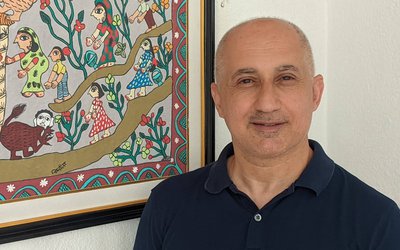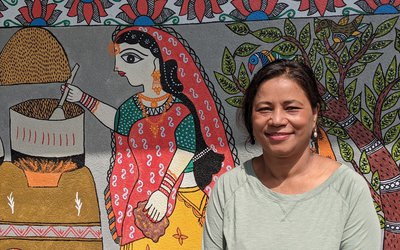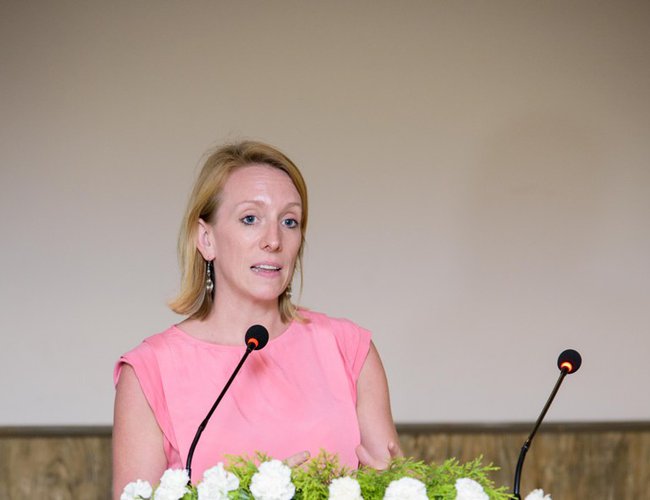
As a country director of Nepal’s leading international organization working in the population sector, how do you see the challenges before Nepal in managing population growth?
To clarify, Marie Stopes Nepal does not work in the population sector. The sector that Marie Stopes works on is sexual reproductive health and our mission is driven by the mission that every woman must have a choice when it comes to their sexual and reproductive health. Clients are at the centre of everything we do.
Our contributions to Nepal’s improved contraceptive prevalence rate, total fertility rate and maternal mortality are delivered in line with this mission. We do acknowledge that the work that we do has significant contributions to population and even the economy. Therefore, the challenge I foresee before Nepal is prioritizing women in this conversation, ensuring they understand their rights and the choices that they have. With this in line, population growth can surely be managed.
We, in the capacity of a development partner for Ministry of Health, have been supporting them in achieving their health objectives by partnering in the areas of family planning and safe abortion services. Our 36 centres across the country in 32 districts along with a large team of qualified doctors and well-trained nurses working in outreach clinics have been providing family planning services free of cost to Nepalese women and men. We are one of the largest service providers as far as non-government sector is concerned.
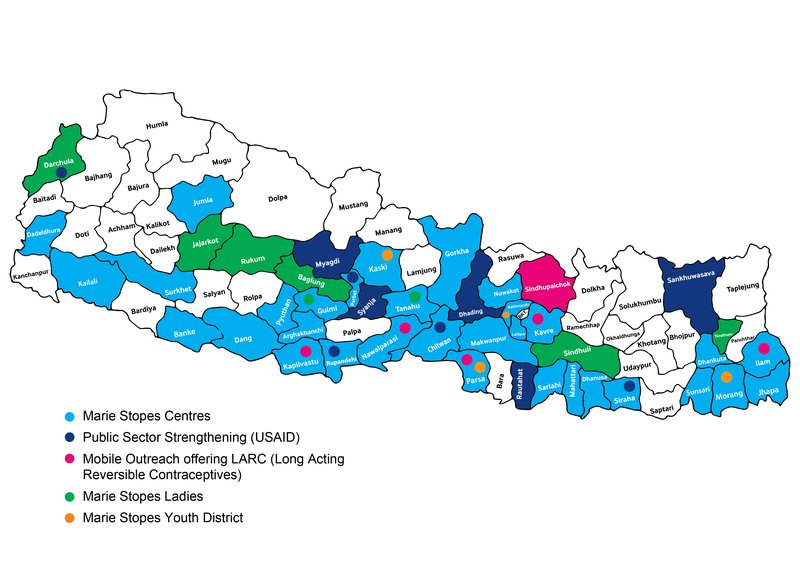
Despite legalization of safe abortion with a new constitution recognizing Reproductive Health as a Fundamental Rights, women have been suffering from so many social problems related RH. What do you suggest to bring a real change in this sector?
Nepal is considered a pioneer for the region when it comes to legalizing safe abortion. Nepal recognized safe abortion as a human right over 10 years ago, which is a success. However, Nepal is also a conservative patriarchal society where reproductive health of women is stigmatized and discriminated, despite the advanced laws. The only part left for full acceptance by general population is the awareness. We would also like to see access to safe abortion being increased and unsafe abortion providers being reduced. Women’s awareness of where they can access safe abortion is important.
Marie Stopes Nepal is working in three folds: Awareness, service delivery and advocacy. We believe that we have skilled and trained human resources who have been mobilized in community level making people aware about reproductive health as a fundamental right; we have well established and equipped service delivery channels like our static centres in 32 districts, outreach mobile camps and MS ladies in rural Nepal providing people with quality informed RH services; and we work in close relationship with Government of Health to uplift the reproductive health standards and advocate for the same.
Having a country of young population with over 40 percent of the population below 25, Nepal needs a special intervention packages?
Yes. The youth demographic is a unique one, not only due the representative size of the demographic group but also due to the evolving nature of their needs, aspirations, and the barriers they must overcome to secure themselves in all aspects of life. Ensuring that they can make the right choices is our collective responsibility. Special interventions are required in that we must acknowledge the same academic approach to SRH hasn’t really gotten the message across and the traditional communication vehicles used to deliver these messages is no longer the preferred vehicles. Social, digital and mobile media consumption is growing with this demographic and traditional media consumption is decreasing. We can only ensure that the message we want them to get is delivered, processed and retained, if we make it interesting and relevant for them.
With the goal of advancing and improving policies that impact young people and their sexual health, Marie Stopes Nepal has been advocating for meaningful youth engagement to ensure that policies and programs are responsive to the needs of young people. “Rockets & Space” is an innovative project that Marie Stopes Nepal has implemented by involving youth voices and listening to them at every step in the process, from development through implementation. As part of this project we also conducted research to guide the project towards meeting young people needs for SRHR. This helped us to move towards innovation and enroll technologies to reach maximum target population. Young people are getting information on their sexual health from the internet and some of the sources are not relevant and is not scientific. Marie Stopes Nepal is providing young people a platform via digital world on sexual health ensuring confidentiality and giving the option to remain anonymous. These characteristics motivate young people and help them openly discuss sensitive topics like sexuality. Marie Stopes Nepal is considering mobile technology cost-effective, on-demand-anywhere and anytime-and based on personal preferences to educate young population on their sexual health and provide them with informed choices. We have been operating Meri Saathi free helpline numbers 16600119756/9801119756 which provides information, counseling and referral to service centres related to SRHR every day from 7:00 am to 12:00 pm. People can also chat with us via our official website www.mariestopes.org.np.
We believe that with time and demand, organizations working in development sectors should opt modern technologies and provide evidence based information on sexual health to young population.
As an organization working implementing programs targeted to meet need of young people, how do you see the current state of Reproductive sexual and Reproductive Health programs of Nepal?
The status of Reproductive sexual health programs of Nepal is progressive. Much of the older population in Nepal find it hard to accept that many young people are sexually active before marriage. The Government of Nepal has recognized RH as fundamental right which has opened the door for more progressive works, but there is still some work to do. Ignoring the needs of adolescents put them at risk of unhealthy sexual behaviors and not seeking safe services. Confidential, bespoke services such as that can be obtained at our youth centres at Marie Stopes Putalisadak, Pokhara, Birgunj and Biratnagar are examples of this.
Just a week before the celebration of world Population Day, Marie Stopes Nepal has released a report on Youth Friendly Sexual and Reproductive Health Services. How do you see the report in the context of formulating the future programs directing to youth?
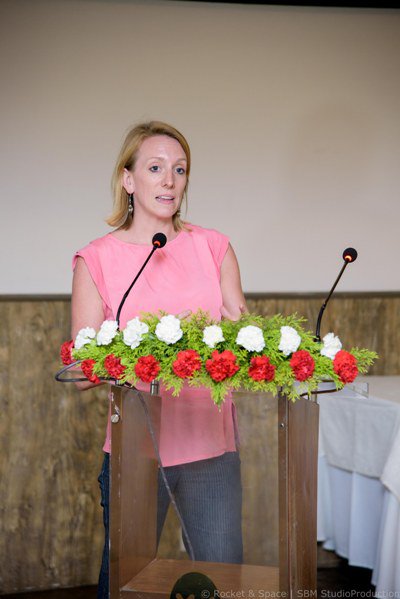
The largest generation of young people in history is about to enter their reproductive years, but more than 40% of adolescents in Nepal who want to prevent unwanted pregnancy aren’t using contraception. Marie Stopes Nepal is there to change this by empowering adolescents to make informed choices about their reproductive health. We ensure that young people have full access to all contraceptive methods. Our providers are trained to give adolescents confidential, affordable and non-judgmental care. We also meaningfully involve youth in designing and implementing programs for their peers.
There are many lesson learned from our four years youth centric project. 40% of total population in Nepal are shaping social and economic realities, challenging norms and values, and building the foundation of the world’s future. Yet too many young people continue to grapple with poverty, inequality and human rights violations that prevent them from reaching their personal and collective potential.
Marie Stopes Nepal is committed to safeguard the rights of adolescents and young people by investing in their future. Providing accurate information and access to sexual and reproductive health including comprehensive sexuality education, will ensure that every young person’s potential is achieved.
Since Marie Stopes Nepal with support from Australian Aid completed four year youth friendly Sexual and Reproductive Health (SRH) Service project, how will it help to expand such program?
The Australian Aid-funded youth project gave us four years to determine what the best methods are for reaching youths with SRH information and services. We have compiled these as ‘best practices’ and have also compiled the challenges we faced from project conception, implementation, to closure. This will guide us as we integrate adolescents and youths into all our demand and service delivery channels. We have now integrated these best practices into all our programmes going forward and other donors are also following the lead on prioritizing youth. Australian Aid continues to be a great support of Marie Stopes Nepal and we are hopeful for more pioneering work between the partnership.
Who are the major developments partners supporting Marie Stopes Nepal in Nepal?
We are working in close collaboration with development partners working in Nepal like FPAN, Ipas Nepal, PSI Nepal on program implementation aspects. We share information among ourselves and work together while handling any of the barriers.
In the last two decades, Marie Stopes has been saving the life of mother providing them various supports including the safe abortion facilities throughout Nepal. What plan do you have for coming years?
No doubt, we will be continuing our excellent work on providing women with informed choices and services. So far, we have 36 static centres in 32 districts. This does not limit our commitment to provide accessible and affordable services to women in rural Nepal. We are expanding our networks through our outreach demand generation activities and provide women in need with accurate information on safe abortion. There is high mobile phone penetration in Nepal. This has made us realized that our Meri Saathi Free Helpline service could be an ideal program to expand in terms of its hours of operation and counseling quality. We are just a call away and we are functioning 18 hours a day and available every day. People can call us for free and get counseling on sexual and reproductive health. We provide quality and confidential services via our service delivery channels. We never turn of clients away. We make sure that they are offered choices and provided comprehensive family planning and safe abortion services. Our services and products are of international standard and the quality is assured frequently. Similarly, we have been implementing mhealth program as harm reduction approach. Women who access medical abortion can register in our mhealth platform and they will be receiving 19 SMS in 8 days for free. The SMS provides instruction on use of medical abortion, side effects and post abortion family planning. We had implemented the program in 4 districts and will be scaling up to 75 districts in coming years. According to DHS, 2011 only 38% of women are aware of abortion legalization in Nepal. Our focus is in making people aware of legal status of abortion among women and young people so that they would access services in government authorized abortion centres. With this learning, we had implemented Safe Abortion Campaign in coordination with government to aware people about abortion legality and authorized service sites.
Despite so many exposures with outside world, Nepalese society is still traditional. How do you see the level of education on SRH among the youth?
Releasing the facts that there is gap between level of education on SRH among the youth in Nepal, Marie Stopes Nepal is implementing its youth project focusing on making young population aware of their SRH needs. Adolescents and youth in developing countries like Nepal often face limited access to health services and education followed by poverty and constricting cultural and sexual norms. However, providing youth friendly environment to adolescents and youth they are vocal about their SRH needs. For this we had partnered with government and private schools in our project districts. We have been working closely with government school/college teachers and oriented them on young people’s SRH to facilitate the session on their schools as per curriculum developed by government. Similarly, our youth pop-up volunteers had been mobilized in schools and colleges to facilitate session on SRHR. Having said that providing quality sexual and reproductive health services from ethical and well-trained health service providers tailored to the needs, rights and desires of young people- especially those living with disabilities has been our priority to bridge the gaps. To date we have reached more than 800 schools/colleges with information on young people’s SRH. Because of these demand generation activities, we have significant increase in young people accessing SRH services through our youth friendly service centres in Kaski, Kathmandu, Morang and Parsa.
How do you see the first one and half years of implementation of SDG particularly in the RH?
Family Health Division, Ministry of Health has certain commitments under SDG where we partner with government is achieving them. We provide services to the clients and at the same time carry out different studies to generate evidence for improvement in program implementation. Piloting of Implanon ( new method of FP), FP discontinuation study, etc are some of the examples.
Along with launching program, Marie Stopes has also been branding the family planning methods through marketing, what implications it has?
Our approach to marketing or demand generation is one of the key success factors that Marie Stopes Nepal has. Understanding the client’s needs, designing awareness activities through relevant vehicles and supporting this with service delivery while constantly monitoring and evaluating impact is how we ensure that we are reaching the groups that need us the most in the most effective manner possible.
We have a few of our own brands of family planning methods that are available in pharmacies and through our call centre, Jodi Condoms and Fire Ecstasy Condoms. These are quality brands endorsed by Marie Stopes International. Furthermore, we work in partnership with Lomus Pharmaceuticals to distribute our authorized brand of Medical Abortion drug, Mariprist. Again, this product is internationally certified and quality checked. In a country with a large unregistered market it’s important that reputable and certified providers can stock high quality product endorsed by the Government of Nepal. Marie Stopes Nepal is expanding its social Marketing business to incorporate more, high quality registered products for sexual health, women’s menstrual hygiene and of course family planning. We are hopeful that the implications of this expansion are more quality product available in Nepal for the consumer to choose.
One of the major achievements of Mari Stopes Nepal is the mobilization of young people in SRH and family planning. How do you look at it?
Being able to work for young people is one of our major achievements. Since, the project conception we have mobilized young people in designing and implementing programs for their peers. While developing youth centric key messages and designs we have our pop-up volunteers providing their feedbacks via pre- & post-tests. Marie Stopes Nepal is able to collaborate with Family Health Division and work as a partner in developing adolescent friendly centre guideline. Similarly, our youth centres are accredited by government as Adolescent and Youth friendly service sites. We have also branded our youth centres as “Rockets & Space”. We have separate room- “Space Station” for young people. They can visit our centres, use space station, read IEC materials and take counseling and services. Further, we have appointed youth friendly ANM- staffs in our youth centres to provide counseling and services to young people. Trained pop-up volunteers are assets for organization who are mobilized in community level to create demand.
As Nepal is in the process of restructuring of its local administrative and health institutions, how will it affect your programs in future?
You are right. With the introduction of provinces and local bodies, the reporting system will have massive reform. We are ready to make changes within our system internally, once the structure has been decided and announced by the government.
- TANAHU HYDROPOWER PROEJCT: A Significant Achievement
- Apr 15, 2024
- AMBASSADOR HANAN GODAR: Sharing Pain With A Nepali Family
- Mar 30, 2024
- VISIT OF KfW AND EIB TO NEPAL : Mission Matters
- Mar 25, 2024
- NEPAL BRITAIN SOCIETY: Pratima Pande's Leadership
- Mar 24, 2024
- NEPAL ARMY DAY: Time To Recall Glory
- Mar 15, 2024





